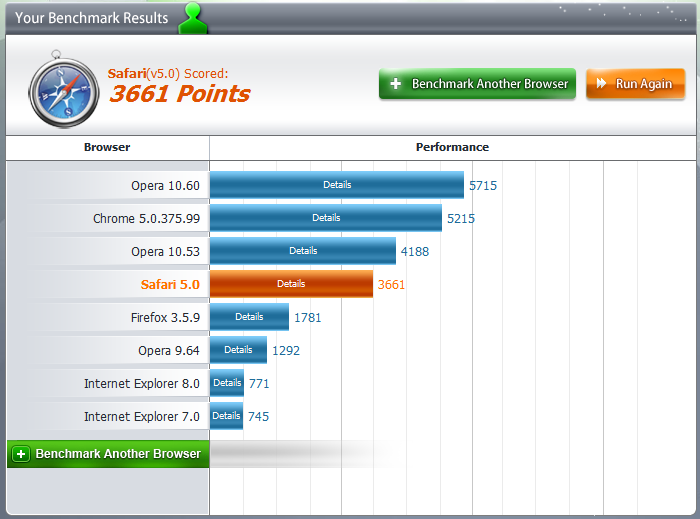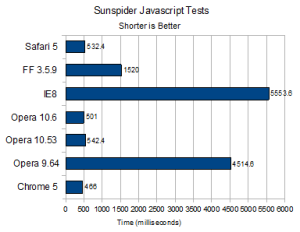First, Let's look back on the old results, so we've got some comparison. For these tests, we'll be using the desktop system from last time, so let's first recap last month's PeaceKeeper results.
Stats: HP Pavilion a6535c
- Intel Core2Quad Q6600 Cpu (2.4 Ghz quad core)
- 6Gb DDR2-6400 Ram
- nVidia GeForce 9500GS graphics card
- Windows Vista home Premium (64bit)
 |
| Desktop system - Q6600 processor (4x2.4Ghz), Nvidia GeForce 9500GS graphics card June 2010 |
So let's see what difference there is with the new browser. For a benchmark comparison, Opera 10.53 is in both, as is IE 7 and 8. The versions tested, and their release dates, are:
- IE 8.0.6001.18928 - unknown (although 8.0.6001.18702 was released March 19 2009)
- Opera 9.64 (build 10487) - March 3 2009
- Opera 10.53 (build 3374) - April 30 2010
- Opera 10.60 (build 3445) - July 1 2010
- Chrome 5.0.375.99 - July 2 2010
- Firefox 3.5.8 - Feb 17 2010
- Firefox 3.5.9 - March 10 2010
- Safari 5.0 (7533.16) - June 7 1020
 |
| Peacekeeper benchmarks, July 5th 2010 (bigger is better) |
As you can see, Opera 10.53 is about 10 points more this time, but it's roughly approximate, and IE7 and 8 are slightly lower. For some reason, Chrome's slowed down a little (or the tests have changed somewhat). It may also be that some things that increased speeds in some places, decreased them in others, or that added capabilities led to greater slowdown, and bug-fixes. The same goes for FireFox (changelog here). It would have been nice to have tested the older versions as well, to keep a growth metric, but alas, these two browsers automatically update themselves - while good for end-users, it's not so good in providing comparisons for benchmarks.
 |
| Safari boasts on their website of their speed |
These tests were all done on the same systems, with the same tasks running on each, so it's a fair comparison this time. In the Peacekeeper benchmarks, Opera 10.60 has a fair advantage over Chrome, at present, while IE's aren't even as fast as Opera 9.64, which was released in March 2009 (IE 8 was released at around the same time, but while opera released Opera 10 in September 09, IE 9 won't be released until roughly September 2010). Incidentally, Safari, who also boasts on their website that they're the fastest, as this shows, it's not the fastest there.
The Peacekeeper tests are not the be-all and end-all of tests though. There are others. For instance, CSS has become an increasingly common thing over the last 10 years. One test is to see how fast a certain css style can be applied. For this test, I used the css test at 'how to create', which is available here. Despite the warning, which says save it, and run it locally, so it purely tests engine speed, and network speed doesn't affect performance, network performance affecting CSS rendering and output is precisely the thing many people are interested in. The tests were run 5 times in a row, starting with the blank page, and then running it again without resetting. The results are as follows (times in milliseconds, shorter is better)
1st Run | 2nd Run | 3rd Run | 4th Run | 5th Run | |
Chrome 5 | 11 | 7 | 7 | 8 | 8 |
Opera 9.6.4 | 12 | 8 | 8 | 8 | 8 |
Opera 10.53 | 13 | 5 | 6 | 6 | 6 |
Opera 10.60 | 11 | 3 | 4 | 5 | 5 |
IE 8 | 23 | 10 | 11 | 13 | 9 |
Firefox 3.5.8 | 40 | 25 | 12 | 13 | 12 |
Firefox 3.5.9 | 42 | 23 | 14 | 23 | 14 |
Safari 5 | 8 | 8 | 9 | 8 | 8 |
 |
| CSS Speeds from the 'howtocreate' benchmark (shorter is better, click to enlarge) |
There is one other thing that's commonly used on the net, and that's Javascript. There are two tests, V8, and Sunspider. The V8 tests are made up of 7 tests, which then give a score. the results are as follows:
 |
| V8 tests (bigger bars mean better, click to enlarge) |
Here, as you can see, It's a close run thing between Opera 10.53 and it's successor 10.60, and Chrome 5 thanks to the EarleyBoyer test, (which Chrome dominated), the general consistency of Opera overall seems to indicate it's dominance over Chrome. Safari also made a good showing, being a reasonable distance back, but it's still behind Opera and Chrome. Firefox comes out barely ahead of Opera 9.64 and IE8, which is poor when you consider these are both browsers from March 2009, while Firefox 3.5.9 is from March 2010, a year later.
Finally, the SunSpider tests. This is a series of tests, which are run through 5 times. I'll give the overall times, click the links to get the detailed results (will open in a new tab).
 |
| Sunspider tests - click to enlarge |
- Chrome 5.0.375.99 - 466.0ms ± 6.6%
- Opera 9.64 - 4514.6ms ± 2.9%
- Opera 10.53 - 542.4ms ± 0.9%
- Opera 10.60 - 501.0ms ± 2.5%
- IE 8.0.6001.18928 - 5553.6ms ± 3.9%
- Firefox 3.5.8 - NOT TESTED
- Firefox 3.5.9 - 1520.0ms ± 3.1%
- Safari 5.0 (7533.16) - 532.4ms ± 2.2%
Conclusion
If the tests show anything, it's that there's not so much between Opera and Chrome performance-wise. I've been a long-time opera user, and I also use Chrome. a lot. That being said, Opera manages all this, AND has 'more' built in/included, whereas with Chrome, you need to go find add-ons. In the end, it's a personal-preference thing. Regardless, they're leaving the so-called 'smart choice' in the dust, and Apple is also lagging a little. The frantic pace with which Opera and Google are releasing new versions of their browser means they'll keep increasing their lead. Mozilla might be tossing out versions just as fast, but until they do a massive revamp of their code base, and spend some of the many millions they get each year in ad-revenue from Google on code development (rather than paying their CEO 1/2Million a year) the better they will be. At present, most of their new releases are bug and security fixes, for the hundreds of exploits and problems in their browser. I'd post a button for Chrome, but apparently, it's not allowed
I'd post a button for Chrome, but apparently, it's not allowed

No comments:
Post a Comment